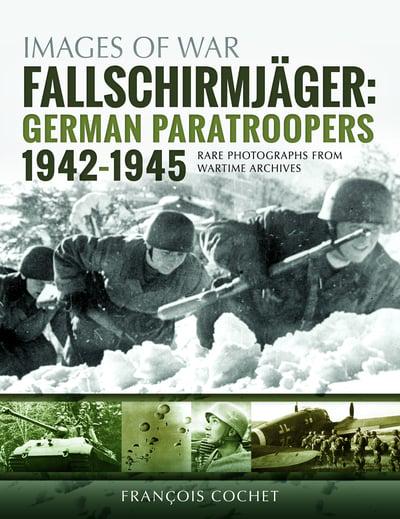Images Of War: Fallschirmjager German Paratroopers 1942-1945
Usually shipped within 24 hours
UK deliveries from £5.95
Delivery & Returns
Delivery & Returns
We use the Royal Mail, DHL Express or UPS for our customers. For UK addresses, deliveries under 10kg are a standard £4.95 via Royal Mail Tracked 48 Service. For orders over 10kg and overseas customers, postage is calculated for you at checkout once you have entered your postal address. This price, does not include any potential custom charges that may apply, depending on the product or destination, as every country has very different import duties / taxes. Online exclusive products (such as trainers) will be delivered to you directly from the printer, separate from other items in your order, but your postage fee covers ALL items in your order.
If you are unhappy with your purchase, please email shop@tankmuseum.org within fourteen (14) working days of receiving your goods, and return it to us at the address below, in its original condition, unopened (with any seals and shrink-wrap intact) and we will issue you a full refund or replace it. Goods must be returned at your own cost. If the item is faulty, you do not need to return it, we will send you a replacement free of charge.
Description
Description
By Francois Cochet
Paperback
As elite troops, the German Fallschirmjäger (paratroopers) were regularly engaged in front line combat during the Second World War. Their famed actions such as the fighting in Scandinavia, the taking of the Belgian fortress Eden-Emal in May 1940, and the Battle for Crete just a year later, have given them the reputation of being determined, courageous and loyal soldiers.
This book continues the pictorial history of the Fallschirmjäger, focusing on the period following the bloody Battle for Crete. Used as elite infantry, first in the USSR and then in Africa, the Fallschirmjäger were able to reconnect with their glorious past, whether in Italy or on the Greek Islands, as they jumped from their Ju 52s to engage the enemy.
Their hard fighting in Italy helped to cement the legend of 'the Green Devils', with the British General Harold Alexander describing them as 'tenacious, highly-trained men, hardened by their many actions and combats'. However, during the fighting in Normandy, the Ardennes and on the Eastern Front, the number of veterans decreased, meaning it was the young German paratroopers who finally surrendered the III Reich on 8 May 1945.
![Images Of War: Fallschirmjager German Paratroopers 1942-1945 Book [variant_option4]](http://tankmuseumshop.org/cdn/shop/files/9781526740700.jpg?v=1748336295&width=1214)

![Images Of War: Fallschirmjager German Paratroopers 1942-1945 Book [variant_option4]](http://tankmuseumshop.org/cdn/shop/files/9781526740700.jpg?v=1748336295&width=88)
![Tank Museum Playing Cards Game [variant_option4]](http://tankmuseumshop.org/cdn/shop/files/ProductShoot_10_10_2025035.jpg?v=1760358498&width=176)
![Tank Museum Wrapping Paper - Two sheet pack Wrapping Paper [variant_option4]](http://tankmuseumshop.org/cdn/shop/products/Wrapp_Paper_All.jpg?v=1748337915&width=176)
![Images Of War: Fallschirmjager German Paratroopers 1942-1945 Book [variant_option4]](http://tankmuseumshop.org/cdn/shop/files/9781526740700.jpg?v=1748336295&width=640)



